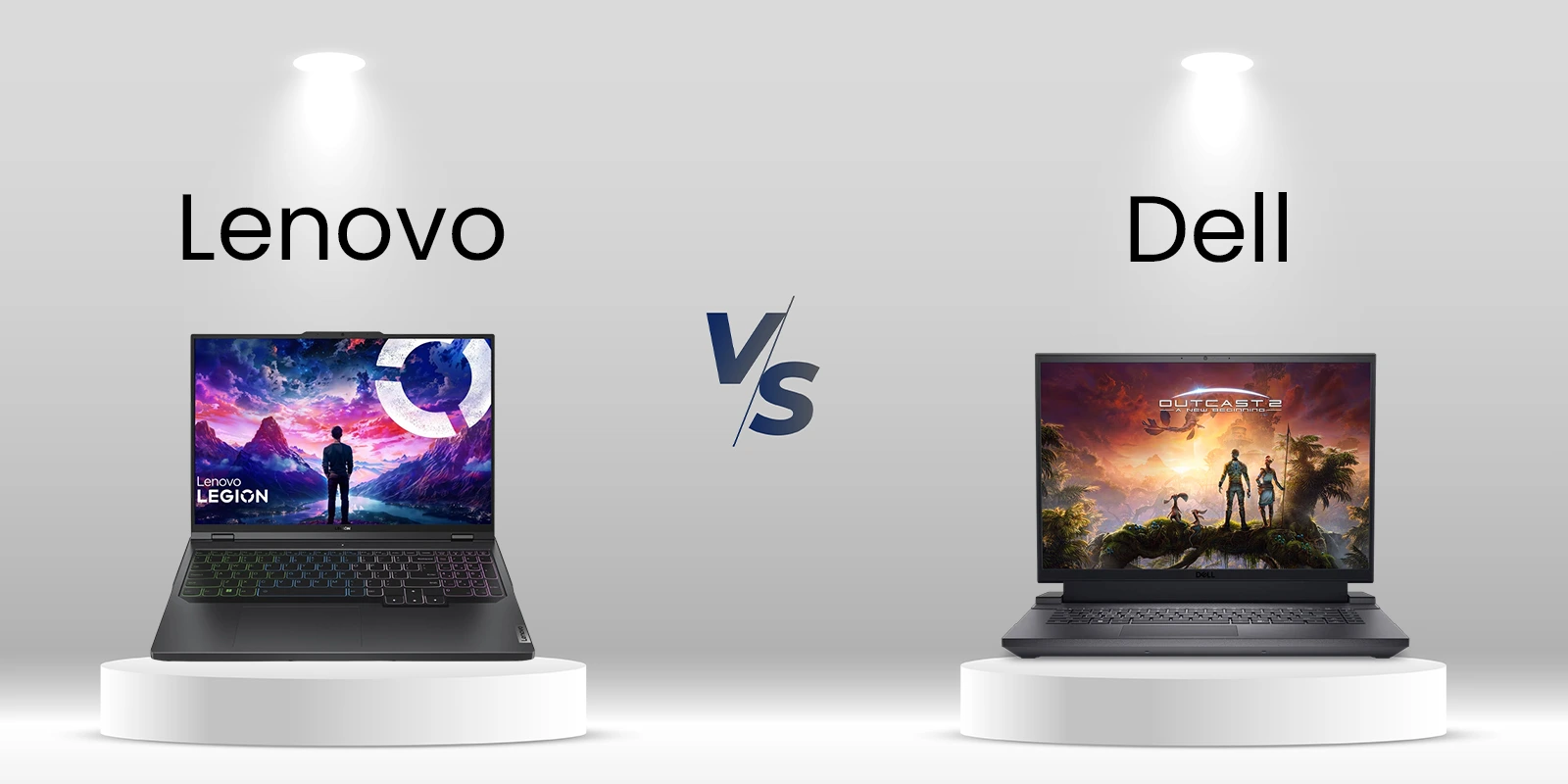Key Takeaways:
- Dell offers premium performance and higher margins, ideal for enterprise and professional segments.
- Lenovo drives higher volume sales with quicker inventory turnover, while Dell provides better per-unit margins as a reliable premium anchor product.
- Retailers should stock both brands strategically to balance profitability and customer demand.
When comparing tech giants in the market, the question that often arises is Dell vs Lenovo — Which is Best? Both these brands have positioned themselves as global tech pioneers offering distinctive products covering extensive market segments. As retailers and distributors it is important to make the right choice by understanding the nuances of the market.
Brand Overview
Dell
Dell is a renowned American multinational company founded in 1984 by Michael Dell. Dell is known for its consistent quality and robust build, reputable customer service, reliability, and innovation in its products. As far as performance goes, Dell is known for its high performance processors more than its laptops. It’s product line covers a wide range of market segment from budget conscious consumers to high-performance enterprise solutions.
Lenovo
Lenovo is originally a Chinese company founded in 1984, and got its global presence after acquiring IBM’s personal computer business in 2005. Today Lenovo stands as a global computing giant offering a wide range of product line from PCs to servers covering consumers to enterprises built on durability and value oriented products.
Product Line Comparison
Here are some of the best sellers in each brand. Understanding each brand’s distinct product categories is essential.
Dell
Dell is known for its Latitude and XPS series. Here are some of the best-selling categories of Dell:
- Latitude series: Offers a wide range of business-grade laptops with enhanced security features
- XPS series: Premium ultrabooks with exceptional build quality and displays
- Inspiron series: Popular choice among students, the series offers budget-friendly mainstream laptops for everyday use
- Alienware: A popular choice among gamers, it offers high-performance gaming laptops
- Precision: This series offers workstation laptops for various professional applications
Lenovo
Lenovo means ThinkPad, and some of its major lines include:
- ThinkPad series: Business-focused laptops engineered for durability are made to endure high performance
- Yoga series: These are some stunning, smart, 2-in-1, versatile, and sustainably sourced amplified with AI convertibles, which are intelligent systems suitable for both creative and professional settings
- Legion series: These are AI-powered gaming laptops with stunning displays built for heavy-duty gaming, giving consumers the ultimate gaming experience
- ThinkBook series: These ergonomically designed laptops are perfect for everyday use. They have stunning displays and high performance.
Components Performance Overview
Comparing the components of Dell and Lenovo, there are several unique distinctions to be considered from the retailer’s perspective:
| Component | Dell | Lenovo |
|---|---|---|
| Processors | Uses high-wattage chips for slightly better performance | Latest Intel and AMD processors with balanced performance |
| Display & Graphics | Superior displays with brightness and color accuracy | Better touchscreen flexibility in 2-in-1 series |
| Thermal Management | Standard cooling system | Superior cooling system, especially in ThinkPad series |
| Battery Life | Optimized in higher-end models | Better optimization across mid-range laptops |
| Build Quality | Premium build with innovative features | Durable and reliable for long-term use |
Pricing & User Experience
Talking in terms of Lenovo vs Dell laptop price, both brands offer versatile solutions at competitive pricing. Lenovo offers flexible pricing for its mid-range models and education segments. However, Dell justifies its higher pricing with its premium build, innovative features, and after-sales support.
User experience comes with the preferred ecosystem and working needs of the end customers. Lenovo shines in the ergonomic design, which is built for long hours of performance and is ideal for office use. Dell, on the other hand, is a good fit for those prioritizing display, speed, and enterprise security.
Dell vs. Lenovo — Which is Better?
There isn’t a definitive one that is better than the other, as each brand offers high-quality, versatile laptops.
If you take Dell, it is known for its premium build, especially the Latitude series, and its exceptional customer support. On the other hand, Lenovo is known for its ThinkPad series, which excels in durability and business-oriented features, as well as its IdeaPad series, which is an ideal budget-friendly option. Ultimately, choosing the right brand depends on customer requirements, budget, quality, and performance.
Retail Considerations
For retailers and distributors, Dell vs Lenovo decision extends beyond specifications — they should consider factors such as profitability, brand movement, consumer behavior, and sales performance trends.
Sales performance trends and consumer behavior
Dell is a popular choice among media professionals who need exceptional displays and prefer cutting-edge design. It is also a good choice for gamers seeking the Alienware experience. Dell also enjoys strong brand recognition among the enterprise and student market segments for the XPS and Inspiron series, which makes it a safe choice for consistent turnover.
Lenovo appeals to business users looking for maximum reliability and budget-conscious consumers who seek better specs at affordable prices. Also, for users looking for versatile convertibles and prioritizing long-term durability. Its ThinkBook series is the highly sought-after model, and Lenovo performs well during back-to-school and festive sales. Lenovo offers competitive pricing, and retailers often report high unit volume sales with discount campaigns.
Inventory management
Lenovo models usually have quicker inventory turnover in their mid-range laptops, especially in the educational, SOHO, and student market sectors. This makes them a preferred choice for retailers and distributors as it reduces the frequency of inventory transitions and clearance issues.
Dell, however, moves at a steady pace, which is preferred by enterprise bulk buyers looking for recurring business at a steady return. However, Dell has reduced SKU complexity compared to Lenovo, which can sometimes complicate inventory planning.
Profit margins and strategies
With Dell, retailers can have premium positioning as they generally carry higher price tags. However, Lenovo has a slightly better lower per-unit margin with its faster movement and high volume sales.
Retailers can leverage Lenovo’s competitive pricing through bundle offers during seasonal sales and bulk sale drives. Dell has a consistent performance with its premium segment, making it an anchor product among retailers and bulk buyers.
After-sales considerations
The ThinPad shows low return rates due to its reliability, and Dell’s consumer lines show good performance as well. Dell has a global customer support and warranty network, which makes it a compelling upsell. Lenovo has also consistently improved its customer support and warranty network, but Dell has the edge in some areas.
Final Thoughts
Dell vs Lenovo — there is no universal winner here as the choice entirely depends on the end customer’s needs, preferences, and budget. Dell stands out for its premium designs, and Lenovo stands out for its durability and versatile solutions across price points. Both Dell and Lenovo offer unique, innovative products suited for a wide range of personal and professional needs. For retailers and distributors, understanding consumer behavior and sales trends helps them maintain a balanced portfolio with both of these brand products.
Looking for Premium Laptop Solutions?
For more information on technology products and enterprise computing solutions, visit Redington Online for comprehensive partnerships and solutions.



